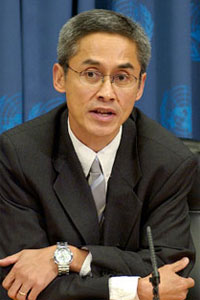
As of last year, according to UN figures, there were nearly 80 unresolved cases of enforced disappearances in Thailand. Considering the country now has a law in place against enforced disappearances, in force since earlier in the year, how should we prevent and remedy these crimes?
Cases of enforced disappearances usually have three elements -- the intent to deprive someone of their liberty (for example, by kidnapping); the involvement of state agents, or those who are under their authority; and the refusal to disclose the whereabout of the victim, whether dead or alive.
The task now is to search for victims of such crimes, and determine whether there were additional actions relating to the mistreatment of the victims which constitute a violation of the law and/or human rights. In Thailand, the main mechanism for dealing with enforced disappearances has been the UN Working Group of Enforced or Involuntary Disappearances, which is under the United Nation's Human Rights Council in Geneva.
There is another legal way in to investigate disappearances and begin prosecuting such cases more thoroughly, namely the International Convention for the Protection of All Persons from Enforced Disappearances, which has been in place since 2010. Though Thailand is a signatory to the convention, it has yet to ratify the agreement -- meaning it remains legally not binding.
It is now time to do so. The convention provides a basis for substantive actions, setting defined parameters for actions regarding the protection of victims, investigation and prosecution timeline, complaints and reporting mechanism, as well as compensation.
Once Thailand ratifies the convention, it will be invited to send in a periodic report on its push to eradicate enforced disappearances, which will be vetted by the 10-member Committee on Enforced Disappearances.
The committee will then propose recommendations for reforms and urge for follow-ups in relation to unresolved cases. Cases handled by the UN Working Group will ultimately be shifted to this committee.
The country should ratify the convention without reservations, as all provisions in the treaty are important. It should also agree to allow the committee to receive complaints directly from individuals affected by enforced disappearances.
In substance, the convention has more innovative provisions than the current local law. The latter is mainly about criminalising the practice, while setting out limited procedural guarantees for the victim.
The convention has a number of advantages over the law. First, its definition of enforce disappearances covers non-state actors, as such action could also be carried out by non-government armed groups and/or other groups acting without authorisation from the state.
As such, ratifying it would mean the state has to assure that it has the laws and mechanisms in place to punish non-state actors who perpetrate the crime.
Second, the convention is clear on where it stands on enforced disappearance, with no exceptions to the practice, which the committee sees as tantamount to crimes against humanity.
The convention contains a procedure for urgent action, which do not require the consent of the state in question. Relatives, for instance, can ask the committee to reach out to the government to help locate their missing friend or family.
Victims and/or their representatives can also ask the committee to rule on cases on enforce disappearances, after which it would recommend the appropriate reparations for the relatives. In one Central American country, this convention is legally binding and enforceable in all courts of law.
Given enforced disappearances are a continuous offence -- meaning the crime only ceases once the victim's location is found -- if Thailand ratifies the convention in 2023, will it cover cases before 2023?
Generally, the answer would be no, partly due to the principle that no criminal law should be retroactive. However, the committee has made it possible for a victim to claim reparation after a country ratifies the convention.
A debate which took place during the drafting the convention, as well as the Thai version of the law, concerned the timeline for prosecution.
Generally, the statute for limitation for serious crimes in Thailand ranges from 10-20 years, after which no action can be taken against the wrongdoer. The CED has advised signatories to the convention to remove such time limit. This will require a legal amendment in Thailand.
The convention invites scrutiny of national security laws and calls for prohibition of secret detentions.
As the current national emergency decree allows secret detention outside the prison system, parts of that decree and related laws will need to be suspended and/or reformed.
This is particularly pertinent to the South of the country, where there have been many instances of enforced disappearances, linked with secret detentions.
The committee has produced various guidelines for making the convention work, which include a guide on how to conduct searches for missing victims, and how to deal with grieving families. This will make it easier for national administrations to adopt protocols and coordinate efforts among various agencies.
The committee has also advised against allowing military courts have jurisdiction over these cases, a point already integrated into the current law.
Lastly, a special provision in the convention also covers children. This was a priority in the drafting of the convention due to instances in South America where under military regimes, children of dissidents were forcibly and clandestinely transferred to new families.
Ultimately, the message is that enforced disappearances inflict immeasurable pain and suffering on families. The sad truth is their grief won't end until they find their missing loved ones.
Vitit Muntarbhorn is a Professor Emeritus at Chulalongkorn University. He has helped the UN as UN Special Rapporteur, Independent Expert and a member of UN Commissions of Inquiry on Human Rights.
